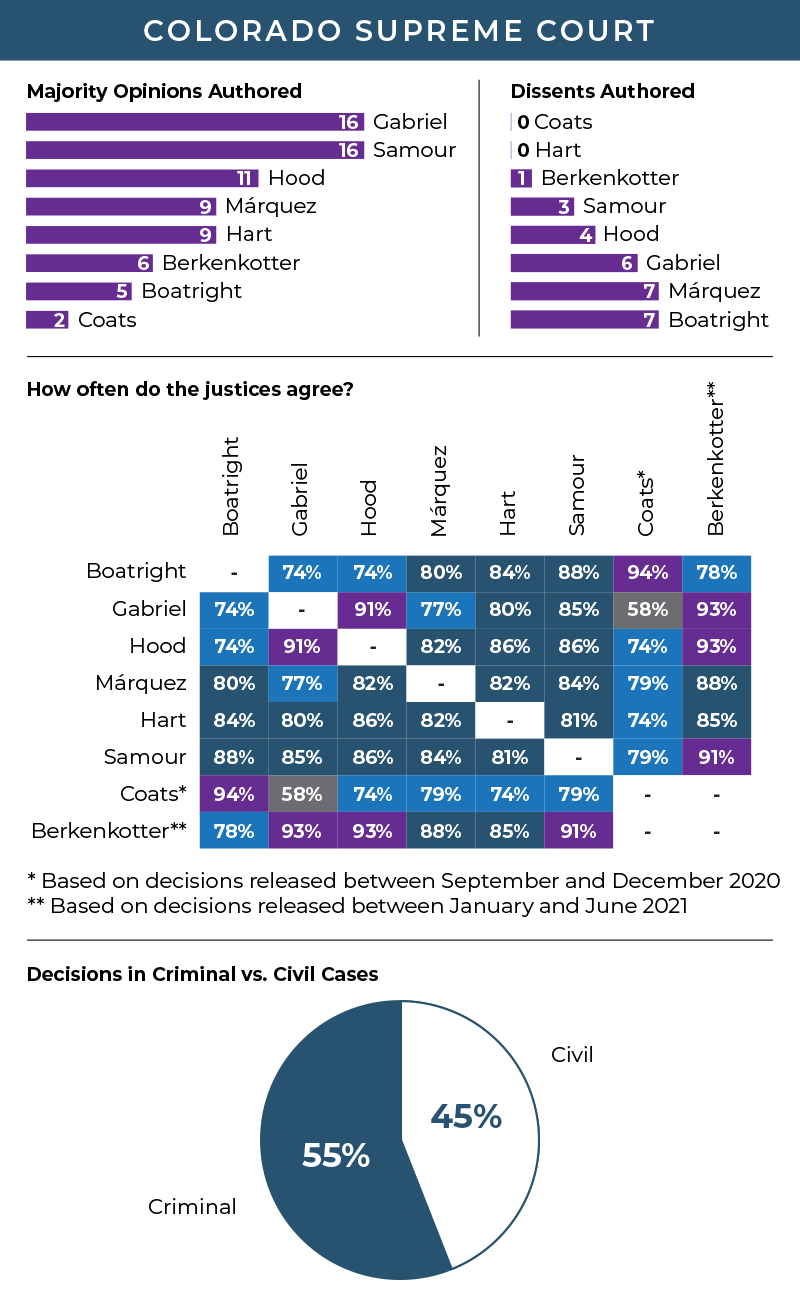
The Colorado Supreme Court had a big year. The court released about 75 opinions during the 2020-2021 term, all while navigating a pandemic, remote hearings, a new face on the bench and a scandal that rocked the judicial branch. Attorneys talked to Law Week about the biggest decisions, trends and developments.
When it comes to political and public law, 2020-2021 was “an absolutely blockbuster year” at the Colorado Supreme Court, said Brownstein Hyatt Farber Schreck shareholder Chris Murray, adding that the highlights included a trio of cases concerning the separation of powers.

In July, the court handed down a decision in Ritchie v. Polis, concluding that the governor may not create an exception to the state constitution’s requirement for ballot initiative petitions to be gathered in person. The lawsuit challenged Gov. Jared Polis’ May 2020 executive order suspending certain signature collection rules to allow petitioning through mail and email due to COVID-19.
The next major decision came in March, when the court found that a high-speed, computerized bill reading did not fulfill the state constitution’s reading requirements. The case, Markwell v. Cooke, stems from the 2019 legislative session, when Senate Republicans, in an effort to stall other legislation, asked for a 2,000-page bill to be read at length. Secretary of the Senate Cindi Markwell responded by directing staff to set up several computers to simultaneously read different sections of the bill at up to 650 words per minute.
In a 4-3 decision, the majority found it was “within the judiciary’s wheelhouse” to weigh in on the constitutionality of the Senate’s actions and affirmed a lower court’s determination that the “unintelligible sounds” produced during the bill reading didn’t meet constitutional standards. But it found the district court went too far when it tried to dictate the specifics of how the legislature must comply with the state constitution by saying bill readings must be “intelligible” and “understandable.”
In the third case, decided in June, the court concluded in In re Interrogatories on SB21-247 that the General Assembly may not dictate the details of the congressional and legislative redistricting process. To address pandemic-related delays in census data, lawmakers introduced Senate Bill 21-247, which directed Colorado’s independent redistricting commissions to use preliminary data when coming up with preliminary redistricting maps. But the court said the bill would violate the state constitution, which requires the commissions to be independent. The court also said the legislature cannot tell courts which standard to use when reviewing legal challenges to the commissions’ work.
“In each one of these cases, a majority of the Supreme Court has said separation of powers —even in emergencies, even when there’s a really big public good to be done — still matters,” said Murray, who represented the pro-business group that prevailed in the lawsuit against Polis. He also represented Republican lawmakers at the district court level in the bill reading case.
Murray added that another case, Griswold v. Ferrigno Warren, which was decided late in the 2019-2020 term, served as a precursor that foreshadowed this year’s trend. In that case, the court rejected a U.S. Senate candidate’s argument that she should qualify for the primary ballot despite not collecting the required number of signatures — a task made impossible due to the pandemic.
The four cases show that “you’ve got what appears to be a working majority on the Supreme Court who, if they’re not looking to police the boundaries between the branches of government, they are newly engaged on this,” Murray said. “And they have shown that they are not afraid to police those boundaries in the right case.”
Despite the pandemic, the court has “pretty consistently taken the position that … the law is what the law is, and the constitution requires what it requires,” said Holland & Hart partner Chris Jackson. “And we’re not going to make exceptions, even though this is a very unusual situation and a very unusual year.”
Jackson noted that many of the decisions involving COVID-19 and political processes were unanimous. But even in cases with dissents, such as Markwell, he said, “I have not seen any justice suggest that there should be more flexibility with the government as they try to deal with this ongoing pandemic.”
NEXT: Big Decisions: Notable Cases Run the Gamut from Divorce to DUIs>>

